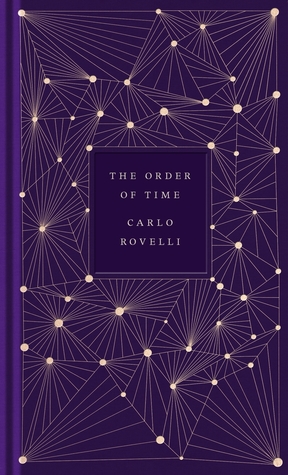The Order of Time by Carlo Rovelli
My rating: 4 of 5 stars
Time is relative.
You don’t need a beautifully-bound, poetry-studded hardback book to tell you that. You need only compare two very different pieces of reading material to see the principle play out – a 500 page John Grisham paperback novel, versus this above-mentioned hardback: The Order of Time, a 150 page treatise on the meaning of time and the universe, written by one of the most famous physicists alive. The Grisham you will breeze through, barely noticing as the formulaic plot unfolds effortlessly. The day and a half of reading will seem like no time at all.
The Rovelli, on the other hand, you will labour and struggle through, slowly reading and re-reading whole paragraphs, with a mounting sense of desperation as everything you thought you knew about time is methodically picked apart, and you’re not even completely sure you understand why. The weeks it takes you to finish it will feel like months.
I take pride in the fact that I did, ultimately, finish The Order of Time while on holidays on a Grecian island. It was a place where the sun bleaches out of your brain the ability to comprehend anything weightier than a young, ambulance-chasing lawyer from Mississippi cracking his first big case against an evil corporation, while saving the trailer-trashy blonde from her alcoholic, abusive husband. And yet despite the tides, tsatsiki and tarama, I managed to read and, I think, gain insights into something that is nearly as compact and dense as was the universe at the moment of the Big Bang.
I don’t claim to have fully, deeply, understood everything Rovelli sets out, so I won’t do the injustice of attempting a thorough ‘plot’ summary. In rough terms, he begins by picking apart all of our preconceived notions of how time works. He starts with the simple observation that time moves faster the closer you are to a surface of the earth, and from there gets you to a place where time, whether past, present or future, does not really exist at all, except as a cognitive dysfunction of our limited brains, linked somehow to this vague concept called ‘thermal time’ that is in turn linked to the second law of thermodynamics. Much of the details are blurry to me already, but that is probably okay because at the end, Rovelli admits that much of it is blurry even to him.
His thoughts on time take you to the very intersection of physics and philosophy, where the answers are no more solid than the baseball bat that Grisham’s hero uses on page 425 to whack the drunken husband. (Despite the six beers he’s drunk, the bat feels ‘hard’ against his skull, but Rovelli reliably informs us that both the bat and his head are in fact nothing more than a coincidence of quantum events, at some primitive stage of entropy.)
It is this blend with philosophy that also allowed me to forgive Rovelli his indulgent inclusion of poetry quotes and many tangential references to the arts. He is Italian, after all.
My only significant disagreements came later in the book. First, where Rovelli goes head-to-head with Descartes on the ‘Cogito argument’. He does not like Descartes’ “I think, therefore I am” very much, since for him there is some distinction between doubting and thinking, which Descartes does not allow in his first principle. I’m with Descartes, because I see doubt as a subset of thought.
My second bone of contention is that his whole treatise on time does not allow for any discussion of probability and determinism. This seems to me a glaring omission, because the fundamental question – it’s also a question situated at the intersection of physics and philosophy – is whether the universe is deterministic or probabilistic. This has important implications for the separation of future from present. With probabilism, the future is uncertain and must always be considered distinct from the present or past, because ex ante it is ‘unknowable’. With determinism, the only thing that makes the future uncertain is the same veil of ignorance that, in Rovelli’s reckoning, makes the past ‘blurry’ and therefore meaningfully different to the present. In other words, in a deterministic universe it is theoretically possible to know exactly what will happen, everywhere and always, from now until the end of time. ‘Future’ exists only because the supercomputers in our brains are not ‘super’ enough to do all the necessary calculations.
There is of course a third philosophical possibility, which sits between probability and determinism. It is what theologians refer to as ‘free will’ – the idea that the human soul is something special precisely because, in an otherwise deterministic universe, we humans – having been made in the image of God – are the sole entities capable of making meaningful choices. Therefore the future, and time itself, exist because humans have souls, and souls allow for choices, and not even God can predetermine what those choices will be.
If you are still reading this review, my guess is it’s felt like a relatively long read. Grisham’s protagonist would probably already have called his third witness by now.
View all my reviews


